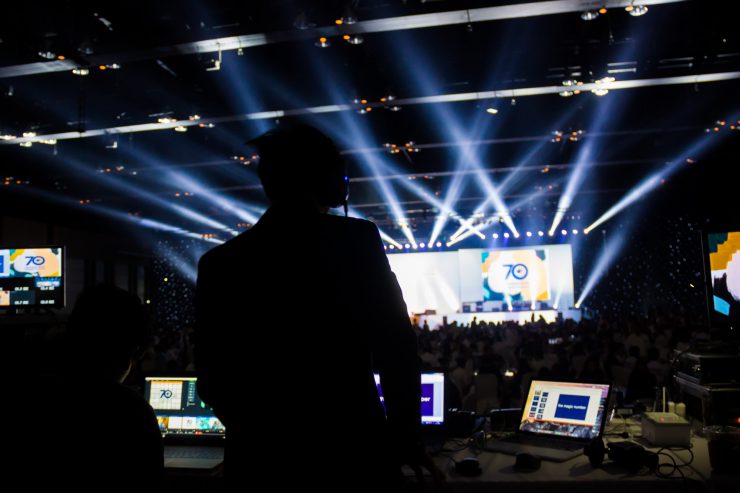Event experts are embracing different innovative event management tools — for good reason. The adoption of event technology can help event planners to increase attendance by 20%. This reduces costs by 30% and increases productivity by 27%.
When exploring the different technologies that can shape your event, it’s crucial to figure out who your attendees are. Why will they attend an event like yours? What makes the difference between a must-attend and a typical event?
Events that hardly nail attendee experiences become irrelevant fast! So, you need to keep up with the industry trends and try reaching new audiences to remain competitive.
Some event-tech trends are bound to stay while others will see significant updates. Here are the eight technological advancements that can streamline the operations of event organizers.
1. Event Diagramming
With the help of event diagramming software, planners can map out everything visually — down to mic placement. The software tools are easy to use, which ensures effective communication in the whole team.
The cloud-based option provides collaborative, customizable, and accurate project planning that’s accessible to all managing parties. This doesn’t just eliminate the time it takes for stakeholder approval, but it improves the relationship of those involved in the event planning process.
2. Video Content
Video is a powerful tech trend that can leverage your events and business. Video content gets a 66% more qualified leads a year. When used on landing pages, they can increase the conversion rate by 86%. This makes it perfect for any type and size of event.
To maximize the effectiveness of your content, you should create video content before, during, and after the event
With such content, it’s easier for sales reps to visually portray upsell, share variations on event proposals, and collaborate with event planners in real-time.
The live streaming of video content is growing in popularity despite the myths surrounding its value. You can expand your audience by encouraging staff and attendees to share the live stream with others who couldn’t make it to the event. They can even invite people to join tweet links to their followers and Facebook live events.
3. Branded Multi-Use Apps
Mobile applications have become an integral part of everyday life. They’re in a greater way shaping the event industry.
You can customize an app to personalize and enhance your attendees’ experience. This makes it convenient for planners to communicate with attendees. You can also engage with them before, during, and after the event. Learn More
Some applications can poll crowds in real-time, survey attendees, personalize the event agenda, and reserve tickets which makes it easier to measure the success of an event. In the case of hotels, branded applications can create a personalized visitor experience. Using the app, visitors can communicate with chatbots to find nearby attractions.
4. Stand out with Stage Design
How a stage is set out in an event can hold your attendees’ attention. Creative use of lighting and 3D projection remains a spotlight for event planners who wish to stand out from the rest. Clear-cut themes influence stage design, and this engages not only the attendees’ eyes but also their senses.
For instance, you can incorporate modular stages in your event — and mix and match them to suit the theme or mood of the presentation. Still, you can use lighting and color to reinforce the theme. You can also change them frequently to match the topic of the session.
5. All-In-One Platform
Event organizers use different tools to manage the event process — from in-venue technology, attendee engagement solutions, to event content management platforms. Various tools can do behavioral analysis, engage attendees across different channels, manage the event’s agenda, and provide all the necessary services to keep the participants engaged.
Facial recognition technology, for instance, uses algorithms that calculate body language, expressions, body shapes, hairstyles, and facial features. Facebook already integrates facial recognition, which helps suggest tags on photos. As the attendees tag their friends, your post will show up in different event-goers news-feeds.
6. Projection-Mapping
Most event organizers use projectors to cast images on flat screens. Projection mapping lights up the surface and turns everyday structures into 3D interactive displays. This makes it easier for planners to transform any space into new designs. Such visual technology is cost-effective, efficient, and can create an optical illusion on anything — from landmarks, stages, or cars.
Since there’s no limit to what you can do with projection mapping, event planners can stretch their imagination. Think — interactive art display, social media walls, maps of convention booths, and many more ideas. This technology can meet different objectives, and that’s why you’ll find it everywhere, from conferences to concerts.
Given that most events offer the basic a/v equipment, projection mapping creates unique experiences without altering the venue.
7. 5G Mobile Technology
Think about the 4G network that you’ve been using on your phone — it’s faster than 3G you used back in the days. Right? 5G is 1,000 times faster, and such a speed has a significant impact on different pieces of your event tech.
Reliable Wi-Fi speeds mean that you can incorporate future trends such as virtual reality and 3D technology.
8. Wearable Technology
Wearable technologies have been around for a long time, and event organizers are now using them to present a new frontier in personalized engagements. Wearables deepen your attendees’ interaction by speeding up registrations, ticketing, and check-ins, as well as simulated experiences.
Event planners should be cautious when using such technology because while the wearables may be cool products, they should support your overall goal. There’s no need to invest in wearables and get data that’s useless.
Make Your Event Memorable with Effective Event Technology!
The adoption of sophisticated event management solutions bridges the gap between the online and physical worlds — which creates a unified, frictionless experience for the event attendees. Event technology aims to solve the challenges facing event organizers, which helps them plan successful events and improve on the downfall based on the data collected.
Are you hosting your next event soon and hope to maximize ticket sales? Check out our blog to learn the things to keep in mind when choosing event ticketing software.







